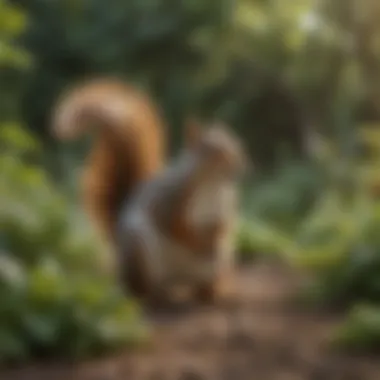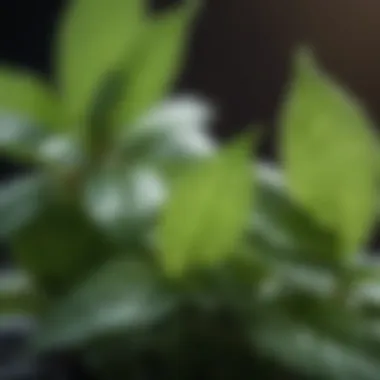Peppermint Oil: A Natural Squirrel Deterrent


Intro
This article delves into the potential of peppermint oil as a natural deterrent against squirrels. Squirrels, which belong to the rodent family, can be a nuisance for homeowners, especially when they invade gardens or attics. Understanding their behavior and preferences can help in choosing an effective repellent. The goal is to provide a comprehensive understanding of how peppermint oil works, its natural repellent properties, and how homeowners can utilize it efficiently.
Pest Identification
Common Household Pests
Among the various types of pests that may intrude into homes, squirrels are prominent. They often search for food and shelter, especially in urban areas. Other common pests include rats, mice, and raccoons. However, this article focuses primarily on squirrels.
Signs of Infestation
Identifying a squirrel problem early is crucial in preventing damage. Signs of an infestation may include:
- Scratching noises in the attic or walls
- Chewed wires or insulation, which can pose fire risks
- Nests, often made of leaves, twigs, and fur, found in attics or trees
- Droppings and urine, giving off a strong odor
If these signs are present, it's essential to take action promptly.
Prevention Methods
Environmental Modifications
Preventing squirrels requires modifications to their environment. Here are some effective methods:
- Seal entry points: Cracks and holes in walls, roofs, or foundations should be sealed. Squirrels can fit through small gaps.
- Limit access to food sources: Properly store birdseed and pet food in sealed containers to reduce attractions.
- Trim trees: Cut branches that are close to your home to discourage squirrels from jumping onto rooftops.
Home Maintenance Tips
Regular maintenance can significantly reduce the chances of a squirrel infestation:
- Inspect your roof and exterior for any vulnerabilities
- Clean gutters to avoid nesting opportunities
- Maintain your garden by removing fallen fruit and nuts, which can attract squirrels.
DIY Pest Control Solutions
Natural Remedies
Peppermint oil has gained popularity as a natural solution against squirrels. Its strong scent is often unpleasant to them. Homeowners can:
- Soak cotton balls in peppermint oil and place them in areas where squirrels are a problem.
- Make a spray by diluting peppermint oil with water and spraying it around gardens or entry points.
It is crucial to reapply the oil regularly, especially after rain or if the scent diminishes.
DIY Traps and Barriers
In conjunction with peppermint oil, setting up barriers or traps can be effective. Consider:


- Building a barrier around gardens using chicken wire or mesh fencing
- Using humane traps for capturing squirrels and relocating them to a safe distance away from your home
"Utilizing peppermint oil not only provides an eco-friendly pest control method, but it also aligns with sustainable living practices."
By combining peppermint oil with these preventive measures, homeowners can significantly minimize the risk of squirrel infestations.
Intro to Peppermint Oil and Squirrel Behavior
The relationship between peppermint oil and squirrel behavior is both intriguing and practical. Understanding this connection can offer effective solutions for homeowners dealing with squirrel infestations. Peppermint oil, derived from the peppermint plant, contains compounds that are known to deter such pests. The significance of this topic extends beyond mere pest control; it touches on the broader themes of natural remedies in our daily lives and their potential effectiveness. By exploring this topic, readers can gain valuable insights into not just squirrel behavior, but also methods of sustainable living that utilize natural products.
Overview of Peppermint Oil
Peppermint oil is an essential oil extracted from the leaves of the peppermint plant. It is known for its strong menthol scent, which many find refreshing. Beyond its culinary uses, peppermint oil is touted for various medicinal properties. It acts as an anti-inflammatory and has antiseptic qualities. In the realm of pest control, its strong aroma is believed to repel many insects and rodents, including squirrels. This oil can be used in several forms, whether diluted for a more subtle impact or concentrated for greater effectiveness. Homeowners may find peppermint oil a desirable alternative to harsh chemicals that could harm the environment or their families.
Squirrels: An Overview
Squirrels belong to the sciuridae family and encompass a variety of species, including tree squirrels, ground squirrels, and flying squirrels. Most commonly, the species interacting with urban environments are tree squirrels. They are known for their nimble movements and curiosity, often leading them to raid bird feeders or invade attics. Understanding the behavior of squirrels is crucial for effectively managing them. Squirrels are resourceful and intelligent creatures, capable of adapting their habits to find food and shelter, which complicates pest control efforts.
Behavioral Patterns of Squirrels
Squirrel behavior is characterized by several patterns, especially regarding their sense of smell. Squirrels rely heavily on scent to identify food and navigate their surroundings. This reliance on olfactory cues makes them susceptible to scents they find offensive. Research indicates that peppermint oil’s strong aroma can disrupt their foraging habits. Squirrels may avoid areas where this scent is prominent.
"Understanding how squirrels interact with their environment is vital for homeowners seeking to deter them using natural methods."
In urban settings, squirrels often face limited food resources, which leads them to become exceptionally bold. Their ability to remember the location of food sources means that repeated deterrent strategies may be required to effectively manage their presence. When applied consistently, peppermint oil may contribute to altering their perception of a space, thus reducing their return.
Understanding Essential Oils in Pest Control
The utilization of essential oils in pest control has gained traction in recent years. This reflects a growing desire among homeowners for natural, safe alternatives to synthetic chemicals. Essential oils like peppermint oil offer promising solutions, particularly against unwanted pests like squirrels.
The main appeal of essential oils resides in their dual functionality. First, they serve as deterrents due to their strong scents. Many pests, including squirrels, have a keen sense of smell and are sensitive to certain odors. By employing oils like peppermint, one can create an environment less inviting for these creatures. Secondly, essential oils are often considered environmentally friendly and safer for use around children and pets when applied correctly.
Several factors influence the effectiveness of essential oils in pest control. Their chemical composition plays a critical role, determining both potency and the nature of the scent. Additionally, the method of application can greatly impact success. For instance, spraying peppermint oil around entry points can create a barrier that squirrels may avoid.
Moreover, the long-term effectiveness and sustainability of using essential oils as pest deterrents cannot be understated. Unlike traditional repellents that may have harmful environmental impacts, essential oils can be biodegradable and provide a safer alternative to chemical products.
In summary, understanding the role of essential oils in pest control is essential for effective home management. This sets the stage for discussing the specific applications of peppermint oil against squirrels.
Peppermint Oil: Properties and Applications
Peppermint oil is renowned for its diverse properties and applications. In the context of managing squirrel populations, understanding what makes peppermint oil effective can lead to informed and strategic usage. Its unique chemical composition and natural characteristics make it a potential deterrent against these pesky rodents. By exploring the properties and applications of peppermint oil, homeowners can assess its viability as a pest control method while weighing its benefits and risks.
Chemical Composition of Peppermint Oil
The efficacy of peppermint oil is largely due to its chemical constituents. The primary active ingredient in peppermint oil is menthol, which accounts for its distinct scent and intense flavor. Aside from menthol, other components play a role, including menthone, isomenthone, and pulegone. These compounds create a strong odor that is unpleasant to squirrels.
When diluted appropriately, peppermint oil can be used as a spray. The oil evaporates rapidly, enhancing the delivery of its aroma, which helps maintain its deterrent qualities. It is crucial to understand that the concentration of these compounds can vary based on the source of the oil, making quality and purity essential. Higher quality oils generally contain a greater proportion of menthol, which may contribute to more effective results in repelling squirrels.


Potential Benefits for Deterring Pests
Peppermint oil offers several potential benefits when it comes to deterring squirrels and other pests. Some of these include:
- Natural Repellent: Being a natural product, peppermint oil introduces an alternative to chemical deterrents, appealing to those who prioritize eco-friendly solutions.
- Safe for Use: When applied correctly, it poses minimal risks to humans, pets, and the environment.
- Ease of Application: Peppermint oil is easy to source and can be applied in various forms, including sprays or diffusers.
Studies have indicated that certain scents, including peppermint, are less appealing to squirrels, making it less likely that they will invade areas treated with the oil. Utilizing peppermint oil can be an effective way to maintain a squirrel-free zone without harming the animals or disrupting the local ecosystem.
Risks and Precautions
While peppermint oil is a natural product, its usage presents certain risks and precautions that require attention. Key considerations include:
- Allergic Reactions: Some individuals may experience allergic reactions to peppermint oil, so it's advisable to conduct a skin patch test before extensive use.
- Proper Dilution: Using concentrated peppermint oil can cause irritation. Therefore, proper dilution with water or carrier oils is essential for safe application.
- Efficacy Variance: The effectiveness may vary between situations and among different squirrel populations. What works in one region may not yield similar results in another.
"Understanding both the benefits and risks associated with peppermint oil can help homeowners effectively use it for pest management while ensuring a safe environment for their families."
In summary, peppermint oil's properties and applications provide a dual-edged sword of opportunity and caution. Homeowners should weigh its potential advantages against possible drawbacks to formulate a thoughtful approach to using this essential oil in their pest control efforts.
Practical Application of Peppermint Oil Against Squirrels
The practical application of peppermint oil as a natural deterrent against squirrels is a key focus within this article. Homeowners are increasingly interested in eco-friendly pest management solutions, especially as traditional chemical repellents can pose risks to both health and the environment. Peppermint oil stands out for its effectiveness and ease of use, offering a natural alternative. This section will explore the various methods for applying peppermint oil, alongside the recommended frequency and dosage to ensure optimal results.
Methods of Application
Several methods exist for applying peppermint oil around your home and garden. Each method caters to different environments and preferences, ensuring flexibility for users:
- Soaked Cotton Balls: One of the simplest methods involves soaking cotton balls in peppermint oil and placing them in areas where squirrels commonly frequent. This could be near entrances, attics, or gardens. The strong scent deters squirrels effectively.
- Spray Solutions: Mixing peppermint oil with water in a spray bottle creates a handy solution that can be sprayed directly onto areas of concern, such as plants, trees, or fences. A typical ratio is 10-15 drops of peppermint oil per cup of water. Shake well before each use to ensure even distribution.
- Essential Oil Diffusers: Using a diffuser can distribute the scent of peppermint oil in enclosed spaces. This option is ideal for attics, basements, or barns. Regular usage can maintain a consistent deterrent effect.
- Planting Peppermint: Growing peppermint plants around your garden can provide a continuous source of scent that may deter squirrels. Furthermore, peppermint plants are relatively easy to care for and can enhance your garden's aesthetics.
"Natural deterrents offer humane options for managing pests while minimizing harm to other wildlife."
Frequency and Dosage
To achieve effective deterrence, both frequency and dosage of application are crucial. Scent intensity diminishes over time, thus requiring regular reapplication:
- Initial Application: For initial deterrence, apply peppermint oil using the aforementioned methods every 2-3 days. This helps establish a strong scent barrier.
- Ongoing Maintenance: Once you notice a reduction in squirrel activity, you can adjust the frequency to every 7-14 days. Supplying continuous scent through a routine keeps squirrels at bay with minimal effort.
- Dosage Considerations: Keep in mind that while peppermint oil is effective, excessive application can lead to unwanted buildup or scent saturation. It is best to start with smaller amounts, gradually increasing as needed, observing squirrel behavior in response.
User Experiences and Case Studies
Understanding the perspectives of individuals who have utilized peppermint oil as a repellent for squirrels offers valuable insights that can guide others in similar situations. User experiences and case studies serve as practical illustrations of how peppermint oil operates in real-world scenarios. This section will illuminate specific elements that contribute to successful implementation, along with considerations that should not be overlooked.
Common Experiences from Homeowners
Many homeowners report a variety of results after utilizing peppermint oil against squirrels. Some common experiences include:
- Application methods: Homeowners often use sprays made with diluted peppermint oil. The act of spraying not only disperses the scent but also allows for immediate visual monitoring of areas treated.
- Observational changes: Many have noted that squirrels tend to retreat swiftly after sensing the peppermint scent. They sometimes even vocalize resistance before moving away, suggesting discomfort with the smell.
- Seasonal variations: Squirrels are known to behave differently depending on the time of year. Homeowners report varied effectiveness during different seasons, possibly due to changes in squirrel feeding habits and their sensitivity to odors.


These collective experiences highlight the necessity of adapting methods based on specific environmental and situational factors.
Success Stories and Limitations
While many accounts showcase the successful repelling of squirrels using peppermint oil, there are also limitations to consider.
Success Stories:
- Flower gardens and vegetable patches: Many gardeners have seen a notable decrease in squirrel activity after applying peppermint oil around their plants. The oil not only reduced squirrel incursions but also kept other pests at bay.
- Ease of use: Homeowners appreciate the simplicity of creating peppermint oil solutions. The process allows for cost-effectiveness and convenience compared to conventional chemical repellents.
Limitations:
- Temporary results: Some users remark that the repellent effect diminishes quickly, particularly after rain. Frequent reapplications are necessary to maintain effectiveness.
- Scent tolerance of squirrels: A few cases indicate that stubborn squirrels may eventually become accustomed to the scent, reducing overall impact. This highlights the need for combination approaches with other deterrents or methods.
"My flower beds were constantly raided by squirrels until I started using peppermint oil. At first, it worked wonders, but now I have to keep reapplying it every few days to maintain results."
Environmental Impact and Sustainability
The relevance of environmental considerations in pest control cannot be overstated. As urbanization increases, the interaction between wildlife and human habitations becomes more pronounced. Choosing non-toxic methods for managing pest populations is crucial, particularly for homeowners who value safety and ecological balance. This section delves into the importance of utilizing natural repellents like peppermint oil and how they contribute to a more sustainable approach to pest management.
Benefits of Using Natural Repellents
Using natural repellents offers a myriad of benefits that extend beyond mere effectiveness in pest deterrence. Key advantages include:
- Safety for Humans and Pets: Unlike chemical repellents, peppermint oil poses minimal risk to humans and pets. It is less likely to cause adverse health effects, making it a safer choice for families.
- Environmental Safety: Natural oils break down more quickly in the environment compared to synthetic chemicals. This minimizes persistent residues that can harm beneficial wildlife and disrupt local ecosystems.
- Reduced Chemical Exposure: Over-reliance on chemical pesticides can lead to resistance among pest populations and development of harmful side effects. Using natural alternatives helps mitigate this risk.
- Sustainable Sourcing: Peppermint oil is derived from a plant that can be cultivated sustainably. This resource renews itself, which is better for the environment compared to finite chemical resources.
Overall, opting for peppermint oil as a natural repellent is not just about repelling squirrels but also about making responsible choices that favor both human health and the environment.
Comparison with Chemical Repellents
When comparing peppermint oil to chemical repellents, several critical factors come into play.
- Efficacy: Peppermint oil has shown to effectively deter squirrels due to its strong scent, which is unpleasant for many animals. Meanwhile, chemical repellents may be more potent but often come with varying degrees of effectiveness that depend on numerous factors, such as application and environmental conditions.
- Health Risks: Synthetic chemical repellents can pose serious health risks, including nausea, respiratory problems, and skin irritation. In contrast, peppermint oil, when used correctly, generally presents a lower risk profile.
- Target Species: Some chemical repellents are designed to target specific species, which may inadvertently affect non-target animals. On the other hand, peppermint oil's broad spectrum may deter multiple species without specifically harming them.
- Longevity: Chemical options may offer longer-lasting protection; however, this can lead to environmental accumulation, raising ecological concerns. Natural repellents like peppermint oil typically require more frequent applications but are easier to manage in terms of environmental impact.
End and Recommendations
In summarizing the findings regarding peppermint oil's effectiveness as a natural deterrent against squirrels, it is crucial to pinpoint the key insights derived from this exploration. Its unique scent properties appeal to those seeking environmentally friendly methods for pest control. Recognizing the behaviors of squirrels, the implications of using peppermint oil can extend beyond mere repelling; it can provide a holistic approach to managing squirrel presence in urban and garden settings. Homeowners can foster a natural balance within their environments by considering such alternatives.
Summary of Findings
The research suggests that peppermint oil has promising potential when used to deter squirrels. Its strong aroma tends to be unappealing to them, providing an accessible option for those wanting to avoid chemical solutions. Key points include:
- Scent as a Deterrent: Squirrels are sensitive to certain scents, including peppermint, which they typically avoid.
- User Experience: Many homeowners report a noticeable decline in squirrel activity where peppermint oil is applied.
- Natural Solution: Unlike chemical repellents, peppermint oil offers a biodegradable and non-toxic alternative that is safer for both the environment and other animals.
"The use of peppermint oil not only aids in managing squirrel populations but also supports sustainable practices in household maintenance."
Final Recommendations for Homeowners
Homeowners looking to implement peppermint oil should consider the following recommendations:
- Application Method: Use cotton balls soaked in peppermint oil and place them in strategic areas prone to squirrel activity, such as gardens or attics.
- Regular Reapplication: The potency of peppermint oil may decrease over time, necessitating reapplication every few days or after significant rain.
- Monitoring Effectiveness: Keep track of squirrel behavior in response to the application. If they persist, increase the concentration of peppermint oil or explore other scent-based solutions.
- Integrated Pest Management: Combine the use of peppermint oil with other non-toxic pest management strategies to improve overall effectiveness.
By implementing these strategies, homeowners can create a more pleasant living environment, while also embracing a responsible approach to pest control.















